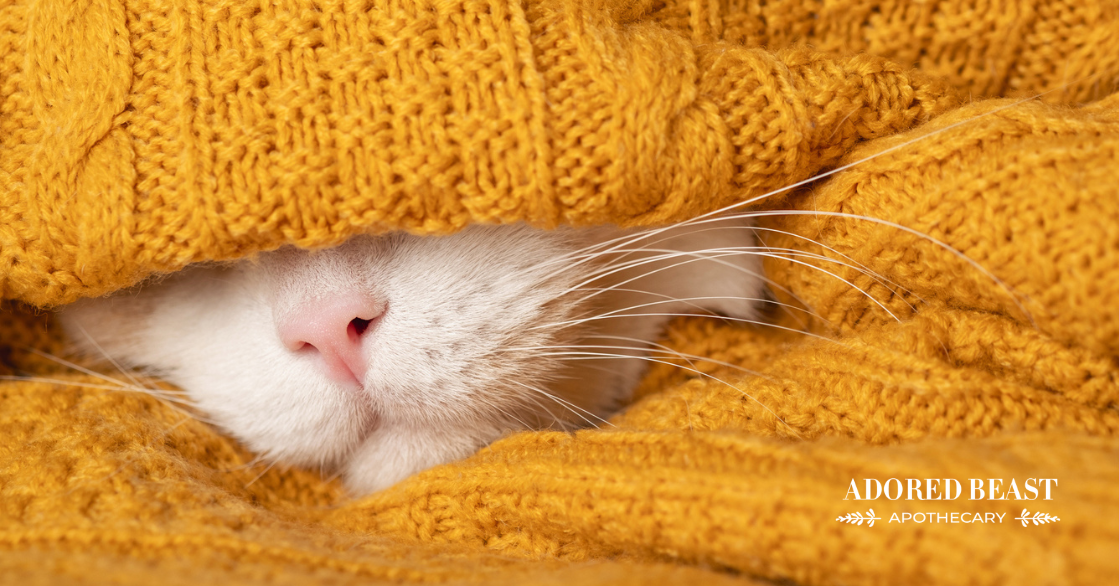What’s all the talk about FHV? Have you ever heard of it?
More than likely, many of you have.
That’s because FHV – feline herpes virus – is not uncommon – almost all cats come in contact with it at some point in their lives. In fact, up to 80% of cats develop a dormant infection and carry the virus for life.
Any health diagnosis with our beloved beasts is unwelcome, but we’re taking this as an opportunity to talk about FHV, ease some of the fears you may have, and help you move forward in a more graceful way, providing valuable support to your cherished feline friend.
What is Feline Herpes?
Feline herpes virus (FHV), also known as feline viral rhinotracheitis, is a viral infection that mainly causes acute respiratory issues.
How do cats get FHV? It’s highly contagious, and cats can get it through a variety of means, including:
- Direct contact – through contact with saliva, ocular or nasal secretions
- Inhalation – breathing in sneeze droplets that contain the virus
- Sharing food bowls and litter trays
Cats can also get the feline herpes virus through things in their environment, such as contaminated bedding or brushes, but this is less common, as the virus only survives for a short period of time, dying typically within a few hours after it dries.
After infection, cats carry the virus with them throughout their entire lives (it lives in nerve cells). Some cats will experience no symptoms and won’t shed the virus, meaning they won’t pass it to other cats. However, some will shed it intermittently, and this is typically following a period of stress or after the immune system has been suppressed.
Symptoms of FHV in Cats
As mentioned, some cats will never show signs of the virus. These are the ones who carry the dormant virus and don’t shed it.
Others will show symptoms at different points – usually called flare-ups. Symptoms can vary depending on the severity of the infection. They are also more common for animals with compromised immune systems and in young kittens – both tend to be more susceptible to the virus and the symptoms can be more severe.
Acute upper respiratory infections (URIs) are the most common symptoms of an FHV infection. These can include conjunctivitis, sneezing, discharge from the eyes and nose, salivation, pharyngitis (inflammation of the mucous membranes of the throat), lethargy, loss of appetite, fever, and coughing. These signs can last anywhere from a few days to a few weeks, and cats with these symptoms typically shed the virus for about 3 weeks after they clear up.
Two other signs of FHV are keratitis and FHV-associated dermatitis. Both are relatively uncommon signs, and typically only happen with long-term infection.
- Keratitis is an infection and inflammation of the cornea. FHV can cause small bracing corneal ulcers to develop, which leads to the keratitis.
- FHV-associated dermatitis is the development of skin inflammation and ulceration. You’ll most commonly see it around the nose and mouth, but you may also see it in other areas such as the front legs. Again, this is a rare manifestation of FHV.
To diagnosis feline herpes virus, often your veterinarian will look for the typical signs and symptoms, and the presumption will be enough. If a specific diagnosis is required, your vet may do a swap of the mouth or eyes, which can then be tested further to see if the disease is present.
Caring for a Kitty with Feline Herpes
Once a cat has FHV, there is no cure. Thankfully, there are many ways that we can support our feline friends to keep flare-ups to a minimum and reduce the impact of this disease.
- Keep Stress to a Minimum – Since stress can weaken the immune system, which can lead to a flare-up, we always want to reduce our cats’ stress in any way possible. This means giving them lots of opportunities for exercise (both mental and physical), engaging with them, providing time outside if you can, and keeping your own stress to a minimum!
- Feed a Fresh Food Diet – We’re not fans of dry kibble for cats – it just does not provide the hydration levels cats need to thrive. Wet food is much better, but we believe a fresh, whole food, species-appropriate diet is best! Feed a variety of proteins, organs, and bones. Rotate in as many different proteins as possible. Want to switch from kibble? Here are some tips for a smooth transition!
- Support with Supplements – There are a variety of different supplements that can help balance out the immune system to keep it functioning at ideal levels. Omega-3 fatty acids are a good place to start, as are pre- and probiotics to help friendly bacteria flourish in the gut. Immune-boosting herbs and mushrooms, homeopathics like nat mur, lysine, and sometimes natural anti-viral herbs are appropriate. Please work with your holistic veterinarian, herbalist, or natural practitioner to make sure your supplement support is set for your specific feline friend.
- Remove Irritants in the Environment – because feline herpes can affect the respiratory system, it’s a good idea to keep your cat’s environment free of any irritants. This can mean harsh chemical cleaners, air fresheners, candles, detergents – anything that will irritate the mucous membranes and make it harder for your kitty to breathe in fresh, clean air.
- Be Careful with Immune Suppressing Drugs – Since a suppressed immune system can cause a flare-up of FHV symptoms, you want to avoid suppressing it as much as possible. If the use of immune-suppressing drugs (ex. corticosteroids) can be minimized or avoided, that’s a good place to start. You want to keep the immune system strong and healthy. If you can’t avoid them, be sure to support the body afterwards with things like probiotics, and flush out the body with things like humic and fulvic acid. We recommend our Felix’s Flora in this case.
In almost all cases, feline herpes does not affect lifespan. If you’ve received a diagnosis, know that your cat can live a long, healthy, happy life. By supporting them with careful choices, you can help maintain a strong, well—functioning immune system and keep any flare-ups from, well, flaring up!












